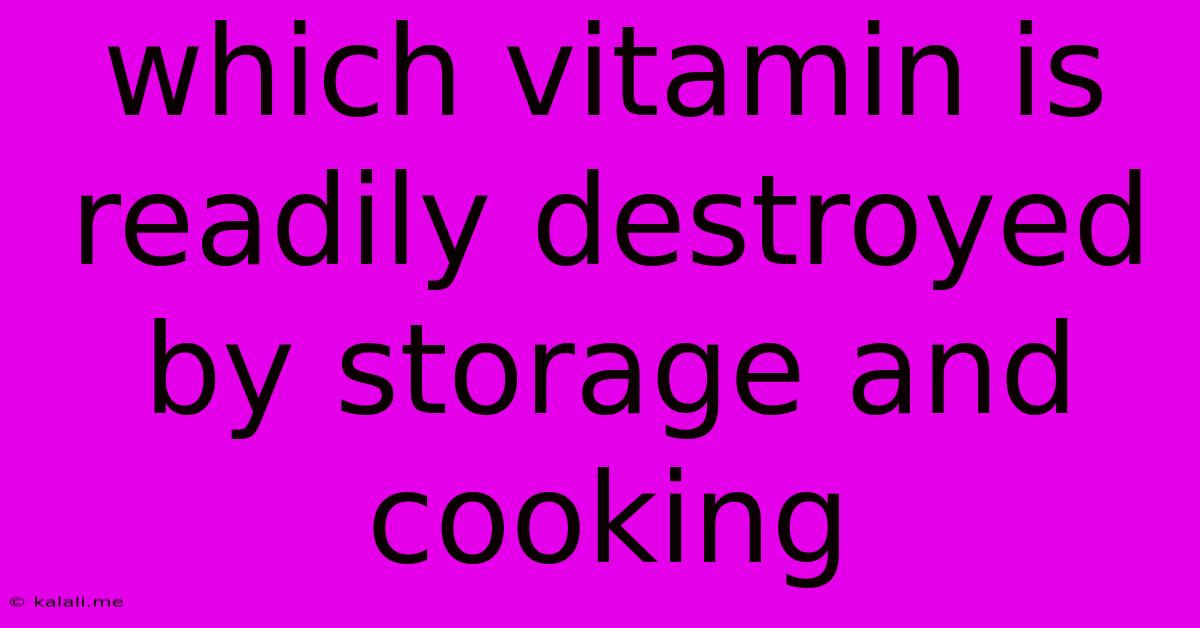Which Vitamin Is Readily Destroyed By Storage And Cooking
Kalali
Jun 12, 2025 · 3 min read

Table of Contents
Which Vitamins Are Readily Destroyed by Storage and Cooking?
Vitamins are essential micronutrients vital for maintaining optimal health. However, many vitamins are sensitive to heat, light, air, and water, leading to significant losses during food storage and preparation. Understanding which vitamins are most vulnerable is crucial for maximizing nutrient intake and preserving the nutritional value of your food. This article will explore the vitamins most susceptible to degradation during storage and cooking, offering tips for minimizing losses.
Key Vitamins Affected by Storage and Cooking:
Several vitamins are particularly vulnerable to degradation, significantly impacting their bioavailability. These include:
Vitamin C (Ascorbic Acid)
Vitamin C is a highly water-soluble and heat-sensitive vitamin. It's easily destroyed by prolonged exposure to air, light, heat, and alkaline conditions. Cooking methods like boiling or steaming, especially for extended periods, can significantly reduce vitamin C content in fruits and vegetables. Even improper storage can lead to substantial losses. Proper storage in airtight containers, away from light and heat, is vital to preserving this crucial antioxidant.
Vitamin B1 (Thiamine)
Thiamine is another water-soluble vitamin sensitive to heat and alkaline conditions. Prolonged cooking, especially in high-heat situations or the use of baking soda, can break down thiamine. Loss during processing is also common, meaning that refined grains often contain less thiamine than whole grains. Storage in airtight containers, away from direct sunlight, can help minimize losses.
Vitamin B9 (Folate)
Folate, or folic acid, is crucial for cell growth and development, particularly during pregnancy. Similar to other B vitamins, folate is sensitive to heat, light, and oxidation. Overcooking, particularly boiling, can significantly diminish folate levels in foods. Proper handling and minimizing cooking time can help retain more folate. Choose fresh, leafy greens whenever possible, and aim for minimal cooking time for best results.
Vitamin B12 (Cobalamin)
While not as easily destroyed by heat as other vitamins on this list, Vitamin B12 is sensitive to light and oxidation. Prolonged exposure to light, especially ultraviolet light, can degrade B12. Proper storage in a cool, dark place is important to protect this vitamin, frequently found in animal products.
Vitamin A (Retinol and Carotenoids)
Vitamin A exists in two forms: retinol (preformed vitamin A found in animal products) and carotenoids (provitamin A found in plants). While carotenoids are relatively heat-stable, retinol is more susceptible to oxidation and degradation by heat and light. Minimizing cooking time and protecting from light are important considerations.
Vitamin K (Phylloquinone and Menaquinones)
Like Vitamin A, Vitamin K exists in different forms with varying levels of sensitivity to heat. Some forms are more heat-stable than others. While not as susceptible as the above vitamins, prolonged cooking can still lead to some degradation.
Tips to Preserve Vitamin Content:
- Minimize cooking time: Use methods that require less cooking time, such as steaming, microwaving, or stir-frying.
- Avoid high temperatures: Steaming or using low to medium heat helps preserve more vitamins.
- Retain cooking water: The cooking water from vegetables often contains valuable water-soluble vitamins. Consider using this water in soups or sauces.
- Store properly: Keep fruits and vegetables in airtight containers in a cool, dark place. Avoid prolonged storage.
- Eat raw or lightly cooked vegetables: Opt for raw vegetables or lightly cooked versions when possible to retain the maximum amount of nutrients.
By implementing these strategies, you can significantly reduce vitamin loss during food storage and preparation, contributing to a healthier and more nutritious diet. Remember that a balanced diet rich in diverse fruits, vegetables, and whole grains is crucial for optimal vitamin intake. Consulting a healthcare professional or registered dietitian can provide personalized dietary advice.
Latest Posts
Latest Posts
-
What Are The Factors Of 112
Jun 13, 2025
-
What Is The Rate Of Doing Work
Jun 13, 2025
-
Acceptance Rate Of University Of Hawaii
Jun 13, 2025
-
What Country Has The Most Bordering Countries
Jun 13, 2025
-
Polar Moment Of Inertia For A Hollow Cylinder
Jun 13, 2025
Related Post
Thank you for visiting our website which covers about Which Vitamin Is Readily Destroyed By Storage And Cooking . We hope the information provided has been useful to you. Feel free to contact us if you have any questions or need further assistance. See you next time and don't miss to bookmark.